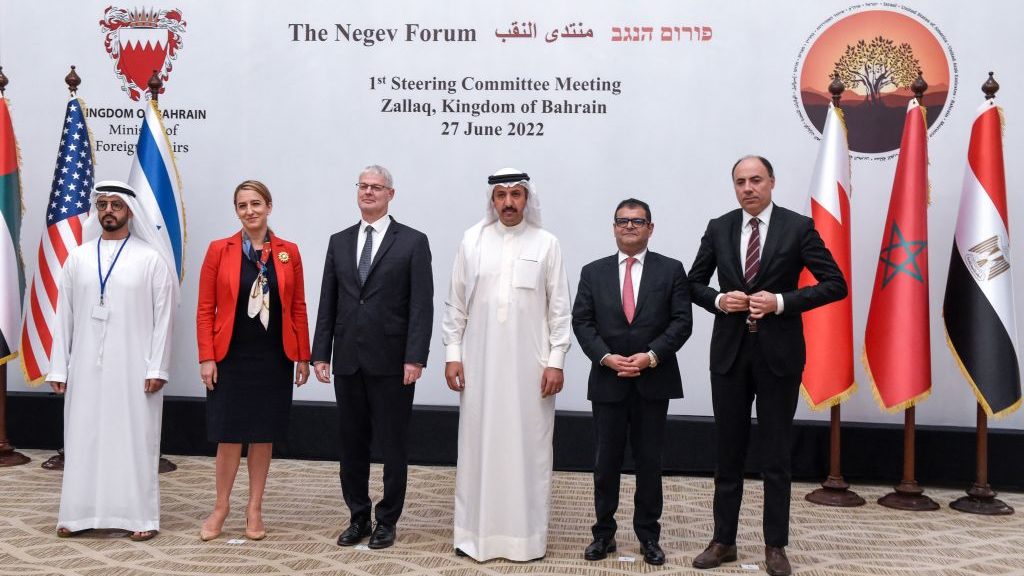Palestinians Say No to US-Sponsored Regional Projects
‘We don’t want any part of the Negev Forum and all related projects while the occupation continues,’ senior Palestinian source says
While Israeli Prime Minister Yair Lapid’s meeting with King Abdullah II in Amman on Wednesday followed several visits and meetings he held with the monarch when he was foreign minister, this week’s session came in the context of the new strategy being designed for the Middle East after US President Joe Biden’s recent tour of the region.
In the last few weeks, the king has been on a mission to overcome what appears to be a major obstacle. The kingdom very much wants to be part of major regional projects, but the price for this appears to be the inclusion of Israel, a condition that Jordan and Palestine reject.
Abdullah told Jordan’s newspaper of record Al Rai that he is concerned about the “marginalization of Palestinians from the planned regional projects.”
A senior Palestinian source close to President Mahmoud Abbas told The Media Line that the Biden Administration had been pushing the Negev Forum (made up of Bahrain, Egypt, Israel, Morocco, the United Arab Emirates, and the United States, but without Jordan) but Palestinians don’t want anything to do with it.
“We will not be part of any of these regional projects because the political framework doesn’t interest us. The Negev Forum and all the related projects are all aimed at integrating Israel in the region and we don’t want any part of it while the occupation continues,” the source said.
The senior Palestinian source concluded that the only political project they support is the Arab Peace Initiative of 2002.
This holiday season, give to:
Truth and understanding
The Media Line's intrepid correspondents are in Israel, Gaza, Lebanon, Syria and Pakistan providing first-person reporting.
They all said they cover it.
We see it.
We report with just one agenda: the truth.


Hamadeh Faraneh, a Jordan-based columnist who writes almost exclusively on the Palestine issue, told The Media Line that the Lapid visit was connected to electoral issues and public relations.
“Remember that November 1 is the date for Israeli elections and November 8 is the date for the US midterm elections. Both Israelis and the US are looking at ways to improve their electoral chances in the fall,” Faraneh said.
But Haifa-based political analyst Wadi Abu Nassar said, “Visiting Jordan is not rewarding electorally.”
He argues that the visit is more aimed at maintaining strategic relations, especially following apparent Jordanian anger toward Israel for strengthening ties with the Gulf states while ignoring Jordanian interests, especially in the West Bank. Jordan does not want Palestinians to lose hope or for Israel to de facto tell the Palestinians “Jordan is Palestine.”
Jordan’s public service television Al-Mamlaka reported that the visit was “aimed at supporting a just and comprehensive peace based on the two-state solution, strengthening security and stability, and regional development which Palestinians need to be part of.”
The king also told Lapid that Palestinians should be part of US-sponsored regional economic projects to underpin stability in the Middle East.
Lapid’s office said the meeting was warm and included a joint lunch with the king and the delegations of the two states.
The two leaders discussed ways “to improve the long-standing relationship between the nations and to strengthen the common interests between the countries.”
The leaders “emphasized the close personal relationship and mutual appreciation as an important pillar for preserving regional stability and real achievements for both nations and the entire region,” the Israeli Prime Minister’s Office added.
The two men also discussed President Biden’s recent visit to the Middle East and the possibilities the trip has opened up for the region, “including everything related to regional architecture.”
Jordanian and Israeli press reports noted that the “leaders also discussed the development of various bilateral projects, including the Jordan Gateway Bridge project [a joint industrial and business zone spanning the northern river border], the establishment of solar facilities in Jordan and desalination in Israel, joint tourism ventures in the Eilat-Aqaba Gulf, food security, agriculture, and transportation.
The prime minister and the king instructed their teams to advance large projects and to move forward quickly.

